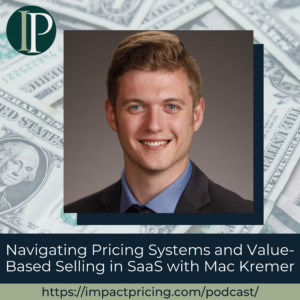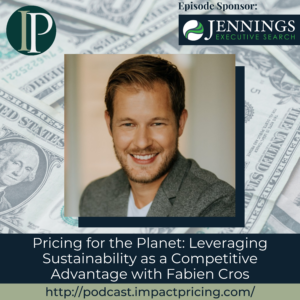Damon Burton helps companies show up higher on Google for words that they can monetize. Damon’s clients include the Utah Jazz and businesses that have been featured on Shark Tank and recognized by Inc.
In this episode, Damon talks about what goes into the SEO service that his company offers and how it works in adding value to the customers, the market segments with which it works best and the pricing strategy he uses to truly add value to customers.
Podcast: Play in new window | Download
Why you have to check out today’s podcast:
- Learn an insight on what goes into an SEO service that SEO National offers
- Important considerations to take into account for SEO building and his unique pricing strategy that truly adds value
- How SEO creates more organic sales than paid ads
“I think the importance in pricing based on value and being transparent is it builds a reputation.”
– Damon Burton
Topics Covered:
04:35 – His career background and how he got started into his SEO business at the moment
05:54 – His unique pricing strategy
07:06 – How are milestones and deliverables set in an SEO business where traffic to a website is concerned
08:56 – The primary considerations to look into how to go about pricing in his niche
11:09 – Setting prices with customer’s value in mind
13:07 – Getting into the perspective of the service his company offers
16:09 – In what market segment does SEO product work best
17:20 – Why is SEO better than pay-per-click, generally speaking
19:53 – Consequences of building SEO on a generic term
21:24 – His valuable piece of pricing advice
Key Takeaways:
“I mean, pay-per-click has its purpose. It’s not that pay-per-click is bad and you can also run them parallel sometimes, like, if SEO is profitable and pay-per-click is profitable, then run above that. But the advantages and disadvantages are, as we said earlier, is that one, if you want to scale paid ads, you have to pay more. Or if you run into a tight quarter and you need to tighten your budget, you’re going to decrease your leads. So, the appeal, the sexiness of SEO is a little bit of that wild card.”– Damon Burton
“My business has grown almost entirely, we haven’t spent any money on advertising, almost entirely on our reputation because once you get in with a certain level of clients and provide value, they’re going to bring you into their inner circle of other clients that you can bring value to. So it might be a slower play, but it’s going to pay off in the end.” – Damon Burton
Connect with Damon Burton:
Connect with Mark Stiving
- Email: [email protected]
Full Interview Transcript
(Note: This transcript was created using Temi, an AI transcription service. Please forgive any transcription or grammatical errors. We probably sounded better in real life.)
Damon Burton: I think the importance in pricing based on value and being transparent is it builds a reputation.
Mark Stiving: Welcome to Impact Pricing, the podcast where we discuss pricing, value and the incredible relationship between them. I’m Mark Stiving and today, our guest is Damon Burton. Here are three things you want to know about Damon before we start. Actually, there’s only one thing I’m going to tell you about Damon before we start. So before I tell you about Damon, I gotta tell you a quick LinkedIn story. I get lots of people who ask me to connect with them on LinkedIn. I say yes to almost everybody. And then what 10%, 5% send me the… Hey, do you want to buy my product? Email. And I disconnect from them instantly. It turns out Damon was phenomenal. He sent me the followup email and it wasn’t, do you want to buy my product? And in fact that email or that message is why we’re talking to Damon today. So what I’m going to do as an introduction, I’m going to read you the message he sent me.
Damon Burton: Hey, that’s a good intro. That covers what we need.
Mark Stiving: It really does. So here we go. Thanks for connecting Mark. I think this is where I’m supposed to puke sales pitches at you and try to get you to buy something, but I’m not. Cool if I tell you a little bit about myself, then I’ll let you go. Happily married for 13 years, have three kids, favorite places, San Diego. President of SEO National. You can probably guess from the name what I do. Been at it for 12 years and wrote a book about it. It’s been cool to work with people like the Utah Jazz, clients on Shark tank, speak at conferences, blah, blah, blah. Here’s the rest about this face that only a mother could love. He gives his URL. Three things. One, I see you’re into podcasting. If my experience could ever be a benefit to your audience, I could send you my one sheet to check out. I bring a lot of free value to listeners about how to grow a business online, all without trying to sneak in a hidden sales pitch to let me know if I can ever help with freebie search engine optimization advice. If Facebook is your thing, I also have a group on there where I offer free SEO advice. Three, they say listen, odd numbers are more powerful, so that’s why I put three but really it’s only two. Anyway wishing you continued success. That’s a wrap. Thanks for connecting. Okay, welcome, Damon. I love that message.
Damon Burton: Thank you. You know, if you would like at some point in this conversation, we can talk about the evolution of that intro because that’s a work in progress, but I’m glad that you enjoyed it.
Mark Stiving: Well there’s no doubt in my mind that it’s a form email that you customized for me.
Damon Burton: Yeah. More or less. And what’s funny is because like I really do like giving away value and I really don’t like take a smoke and mirrors angle. And so it’s funny because the majority of the people that write back, they say something positive like, Oh, like even yesterday I had a guy that said, Hey, this is great, I’m going to steal this. And I get that quite a bit. Like this is a great intro. I’m going to take the same concept, but then every now and then I get these Debbie downers and I got one yesterday and this guy was like, Boohoo as much as this is trying to be funny and authentic, it ain’t working and disconnect and whatever.
Mark Stiving: Yeah. Well, the question is what’s the percentage of the hit you get? And, and I gotta say in all honesty, it’s unique. I have so many followers, there’s so many people I’m connected with and I’ve never seen one that good.
Damon Burton: Well thanks. Yeah, I mean I’m in the same boat. I get hit up all the time. And so I was thinking about it and I was like, just like you said, I don’t like the sales pitches. Nobody likes the sales pitches, but we all know we’re there on LinkedIn. So we’re all open to value exchanges. And so I said, how can I communicate this without just puking… Like I said, without puking sales. So I said, here’s me and I make it very clear. I’m gonna let you go after this. And so, you know, that’s right at the beginning, so they’re not going, when is this going to end? And so, yeah,
Mark Stiving: So normally on the podcast we talk about pricing, but today what I want to do, if you’re okay with this is I want to talk about business and particularly your business and I want to weave in pricing conversations and lessons as we go. Does that sound fair?
Damon Burton: Sure. Yeah.
Mark Stiving: So let’s start with, tell us what do you do and what are some highlights on how you got there?
Damon Burton: Yeah, so I started a company called SEO National. We’re coming up on year 13. And so SEO stands for Search Engine Optimization. If you’re not familiar with what that is, the goal is to get your website to show up higher on Google and other search engines for words that you can monetize without paying for ads. And so when I started that company originally, you know, my background started in design and so I did design and then I had a client come to me and say, Hey, tell me about this Google thing. And I said, I know enough that if you’re willing to take a risk on me, I’ll take a risk on you. And so we worked out this like exchange where you didn’t have to have a big investment and I wasn’t being, you know, immediately reimbursed for my time accordingly because I didn’t entirely know what I was doing.
Damon Burton: I knew enough to experiment. And so I said if it works out then pay me retroactively. And if it doesn’t, then you know, it was worth me giving it a try. And so that worked out really quickly and we hit those benchmarks. And so then they referred me another client, they kind of did the same arrangement, hit their benchmarks really quickly. And so at that point, I said, Hey, SEO is my thing. Like, I like this. This is fun. It’s exciting. I’m getting progress. And so at that point I said, I don’t want to be the agency that offers at all and is kind of mediocre at all of it. And so just SEO is going to be my thing. And so that’s kind of how it got started. And then we can talk about the growth and scaling, you know from there. But that’s the background.
Mark Stiving: I love the pricing strategy that you started out with. Look, I don’t want to charge you money. I just want to deliver the value and then if it’s actually valuable, pay me for it.
Damon Burton: Yeah, I’m never one… especially in internet marketing, there’s a lot of smoke and mirrors and you know, people can go a long time paying for service without seeing quantifiable or tangible value. And I never wanted to be that guy that took advantage of that position. And so I tried to be really transparent and even nowadays it’s still long, slow progress, the way SEO works. And so I’m very clear during negotiations with a lead. I say you’re in it for at least a year and here’s why. As they’re signing the contract and the contract, it says, Hey, remember this is going to take a long time. And then as we start, I send an email of expectations and then my team has a sequence of emails where, you know, one team member says, Hey, I’m so and so. Here’s what I’m going to do. Expect this from me. And then another one does the same thing, expect these different things. So yeah, I try to be realistic about the value and the cost and the time and everything.
Mark Stiving: Do you set milestones or deliverables? I assume SEO is about bringing people to my website, bringing the right people to my website, and then the people who are going to convert to my website. Or do you set milestones that say, Hey, we’re gonna get this many within three months visiting your website?
Damon Burton: No, you don’t necessarily quantify the traffic because SEO is an evolution. It has the complete opposite pros and cons of paid ads. So with paid ads, the one advantage is as much quicker. You can collect data quicker and then you can pivot from that data. But the downside to paid ads is that, you always have a budget associated with it. And so if you want to scale, you have to increase your budget, or if you need to tie in your budget, then you’re gonna end up decreasing your leads. So the opposite is true about SEO. SEO is a slower process. And the abbreviated version of why it’s slow is because you’re building a brand and you have to increase that credibility. And that comes down to improving your website speed, making sure it’s mobile friendly, building content. And then when you push that content out there waiting for Google to find it, deciding what Google’s gonna do with it.
Damon Burton: So for those reasons, you don’t pick literal numbers, but what you do is you say, Hey, based on averages based on industries, because every industry has a different market cap of how many people are in that searching for that product or service. So depending on that, you say, Hey, these are kind of averages. And then at first we’re going to go off of how your rankings are increasing, where you’re showing up on Google for page five to page three and you’re not gonna get traffic until you get to page one. Then when you get to page one, we can start quantifying traffic and then, you know, estimating the scope of growth.
Mark Stiving: Nice. And so you, I take it you agree ahead of time. These are the terms that we’re going to move to page one. These are the search phrases or search terms.
Damon Burton: Yeah, we do a lot of front-loaded competitive analysis and keyword research and depending on the client, the competitiveness of their industry, that usually takes two to six weeks before we finalize the target.
Mark Stiving: Okay. And if you don’t mind me asking, tell me how you price these things. And I don’t need to know the prices. I want to know how you go about pricing.
Damon Burton: Yeah. It’s primarily based on three things. So the first thing is what’s the market in the industry? So is it hyper-competitive like weight loss, where there’s a large market and a lot of money being thrown at it? Or is it more niche? Is it just like a random little widget that only certain people want? The second thing is what’s the geographic or demographic targets? So are you a dentist in one city? Or are you an attorney in a county? Or are you a retailer in a state? Or are you a service that’s national or international? So the broader you go, obviously the more people you’re fighting against, the more competition, the more assets needed, the more time and more cost. And then the last thing that we base it on is what backend this website run on? Is it search engine friendly more or less than other website back ends. And we can work with any backend, but the structure of the backend in, you know from, for example, WordPress, it might take us five minutes to change this one thing and on a different backend it may take us 45 minutes. So we can still do those things. It just may take longer.
Mark Stiving: How’s the podcast going? Are you getting value? Research shows that people don’t really value what they get for free, but I’m hoping you’ll prove this research wrong. Please demonstrate to us and the entire world that you value this podcast. Would you please pause the podcast. Subscribe if you haven’t already done so. Rate the podcast and leave us a short review. You’d be doing a huge favor. And research shows, if you invest this little bit of time, you’ll probably like the podcast even more. Win-Win! Pause. Do it now. We’ll wait for you.
Mark Stiving: I’m trying to relate that back to value to the customer for a second. So the back end is certainly a cost-driven. This is going to take us longer. The other pieces I think were really tied to value. If I think about the size of the market for a second. if I’m going after the entire US or the entire world, it’s much larger market, much larger value, hopefully, potentially than if I’m an attorney going after it and after a county. How do you think about the customer’s value when you’re setting those prices?
Damon Burton: So it boils down to the assets that we create. If we had to condense it to a thing, it would be the assets. So what type of value and asset creation are we going to bring? So if you are the business, that’s in just a city then to compete against the other people. Because if you think about it, you’re really fighting against who is already there on page one of Google. When we do the competitive analysis, we say, okay that competitor has this type of content strategy that we’re fighting against and they have this type of external credibility that you need to outpace. So based on that, we need to create assets in this quantity at this interval. And it’s important to understand that you can’t just mass produce content, you know these little variables within the scope of SEO fulfillment because Google will pay attention to the trajectory of the assets you create.
Damon Burton: And so in particular, one type of thing you do in SEO is called backlinks. And so backlink is when another website links to your website. And so the quantity and quality and by quality, I mean, is a website that’s linking to you relevant or is it irrelevant? So the more relevant, the higher the value that link is. So Google will pay attention. If you go from having five links to 5,000 links in one month, that’s obviously been artificially inflated. So not only do you have to take in account the logistics of just creating content but then even if you could mass produce it, would it raise red flags with Google? So you have to find that happy medium through that competitive analysis. So the value is identifying the strategy and then saving them the time in producing that content. Because a lot of times everyone says, well, I have a blog or I can do content. Well, sure, but is it optimized content?
Mark Stiving: So this is pretty fascinating. I see that I want to use your services, right? I mean, I want people to come to my website and see all this. I think that’d be fascinating, but it isn’t clear to me yet. What are you gonna do for me? What are you going to deliver for me? Are you writing my content? But by the way, I blog probably twice a week.
Damon Burton: Okay. Yeah. So why don’t I walk you through the scope of launching or boarding a client.
Mark Stiving: Sure.
Damon Burton:So the first two to four weeks is going to be strategizing. So we’re going to do the competitive analysis, the keyword analysis to find out who we’re fighting against, who we need to outpace, and then what we are going to strategize to rank you for, that you can monetize. Cause we don’t want to just have you show up on page one for just anything and just go, Hey look, you’re on page one. So we do that research to go, okay yeah there’s a market for this. People are searching for this and it’s immediately relevant to your product or service so you can monetize it. So then while we are strategizing that, then the other part of my team is going through and fixing the structure of your website. We don’t often need to redesign it unless it’s just like super obvious that there’s no good call to action. So usually what we try to do is retain the existing branding. If the client’s happy with it, but make it load quicker, make it more mobile-friendly, make it so search engines can follow the content and the structure of your website more easily. And so once that is done, usually at the time we finished the structure updates, we also finish the content strategizing so then we can launch it in sequence. So you asked in my writing box for you? Yes, usually that’s part of it. If we have to just get real black and white as far as what the deliverables are, on average we blog, you know, two to four times per month per client. Then we also have an account to distribute news directly through Google news. So we work with the client, say, okay, what can we brag about? What new product do you have? Do you have a new VP of something? Are you going to a conference? And so we want to get that value out there because Google is going to say Mark’s competitors are not in Google news. Mark’s competitors are not talking about their product or service as value-added as he is. And so we’re building that brand awareness and credibility. A lot of times we’ll take that content and then we’ll repurpose it into, again, depending on the client and their level of competition, videos, graphics, audio, different types of media. So basically it’s about outpacing your competitors by representing that you are more of an authority than the other guys are.
Mark Stiving: There’s so much going on behind the scenes here that I’m fascinated that you understand it and I will never understand. If I were trying to sell your product, I’m trying to put a price on it or trying to talk to the marketplace, I would try to figure out how much value would improved SEO deliver to you as a client and try to price it that way. And so I could see the things we talked about already where the geography made a big difference. But I would say the market segments make a big difference. So if I were trying to sell SEO for Rolex watches, yeah. Versus SEO for Bubblegum, one of them I’m going to get a huge return for every hit. The other one, I take a ton of hits in order to get a decent return.
Damon Burton: Exactly.
Mark Stiving: And it isn’t even my effort. It’s their value. Does that make sense?
Damon Burton: Yeah, you nailed it. I mean, we turn away leads a lot of times for that reason because obviously we’d love their business, but it just doesn’t make sense that they’re going to get a return from our services. And for the exact reason that you said, you have to have a decent enough profit margin and you also have to be in an existing business, unless you’re a startup that has venture capital funding, it doesn’t often make sense to do SEO at least first, because it is such a slow process to build that credibility. It also doesn’t save a sinking ship. Like if SEO is your last straw, it’s not a good strategy. So you gotta be in that middle ground where you have the disposable income to pay for the services for the months in advance for it to take to unfold and bring its full potential in value. So yeah, it doesn’t work for everybody. Exactly.
Mark Stiving: Yeah. I’m going to change the language you just said. I don’t have disposable income to pay for services. I have extra resources to invest for the future.
Damon Burton: Yeah, yeah, yeah. Fair enough. Yeah. Yeah. Sometimes when I say disposable income, I think it’s cost enough that everybody gets it. But yeah, I cringe a little when I say that sometimes.
Mark Stiving: I cringed a little when I heard it. I was like, no, no, no, I don’t have disposable income. What are you talking about?
Damon Burton: Cashflow. You need the cash flow.
Mark Stiving: Yes, absolutely. We need the cashflow. So I’m finding this fascinating. You seem to brag about the fact that you’ve never paid for an ad and yet I find the pay per click theory strategy simply because I know I put in X number of dollars, I got this many leads, this many converted, I got this much revenue. I can really easily create a, here’s what it costs me for this much revenue or even this much profit. And so why do you not like that? Or why is SEO better?
Damon Burton: I’ve never been one of those guys that picks aside. I mean, pay-per-click has its purpose. There’s, it’s not that pay per click is bad and you can also run them parallel sometimes. Like, if SEO is profitable and pay-per-click is profitable, then run them both. But the advantages and disadvantages are, as we said earlier, is that one, if you want to scale paid ads, if you want to scale, you have to pay more. Or if you run into a tight quarter and you need to tighten your budget, you need, you’re going to decrease your leads. So the appeal, the sexiness of SEO is a little bit of that wild card. You know, I’ll give you an example where we have a client that’s been with us for, gosh, they’re that second client that I mentioned. I mean, I still have clients from 12,13 years ago.
Damon Burton: Probably my first half a dozen clients are still with us. So over the course of those years, the one client, when they started, they did $80,000 a year in sales online. I just sent them a message yesterday that as of the beginning of September, they’re at $750,000 in organic sales. That doesn’t include their paid sells, their referrals, anything else. Just SEO driven sales. So there is not a cap with SEO and with pay per click, your budget is your cap. Yeah, there’s a little bit of abstractness to SEO, but it’s only abstract until you can collect that data. So it’s just a little bit of a slower data collection process because once you get that year under your belt and you can start to say, Hey, I paid this much towards SEO and it’s generated this much business, then you can do the quantification thing.
Mark Stiving: Nice. Coach me for just a second. Would you? I was actually talking to somebody yesterday. She says they have phenomenal SEO, but it’s on a really generic term. So for the sake of argument, I’m going to say it’s the word consulting. It wasn’t, but let’s say that’s what the word was and that feels, let’s say that I could get phenomenal SEO on a word called pricing. It feels way too broad to be valuable.
Damon Burton: No, you’re correct. Yeah. So the problem with doing that, there’s a couple of problems that immediately come to mind. So the first problem is you’re gonna waste a ton of time because if you get a ton of leads, they’re not qualified. So probably 9 out of 10 of those leads for the theoretical consulting term are people looking for consulting in a different capacity. So you’re going to waste a ton of time. The other thing is that it can actually over time, create negative consequences for your search engine optimization because eventually a Google is going to say, wow, Mark’s site ranks really well, but he has a high bounce rate. So if you don’t know what a bounce rate is, it’s how Google quantifies as visitors enter your website and an exit. So if they come in quickly and leave quickly, that’s going to have a negative impact on your bounce rate. The longer they stay, the better your bounce rate is going to be in Google is going to look at that and say, Hey, Mark’s website is really relevant because people stay longer or he’s going to say, wow, people bail really fast. And once Google quantifies that, then it’s going to sort of thank your site. So it could negatively impact all of the other targets that you have niched down and ranked well for.
Mark Stiving: So it’s important to make sure that whatever I’ve ranked for, people actually care about. People actually want to stay on my site and listen or see what we have to say.
Damon Burton: Yup.
Mark Stiving: Excellent. Excellent. Damon, we are running out of time, but can I ask you, I’m going to ask you the question that I ask everybody, even though you’re not a pricing person.
Damon Burton: Okay.
Mark Stiving: What’s the one piece of pricing advice you would give our listeners that you think could have a big impact on their business?
Damon Burton: So I’ve always priced on value. And I know that’s kind of like pretty generic term there. I always try to be realistic and not gouge customers because I like to sleep at night and so obviously extra money would be great for anybody, but I think the importance in pricing based on value and being transparent is it builds a reputation. My business has grown almost entirely, as you said, we haven’t spent any money on advertising almost entirely on our reputation because once you get in with a certain level of clients and provide value, they’re going to bring you into their inner circle of other clients that you can bring value to. So it might be a slower play, but it’s going to pay off in the end.
Mark Stiving: Nice. I got to say that I enjoy talking to you so much. You obviously want to deliver value to your clients. You’re not trying to capture all of it back. So it’s how do I grow my business by delivering, you know, value as the only word I could come up with that made sense.
Damon Burton: Yeah. I mean if we got another 30 seconds, I can give you a literal example.
Mark Stiving: Feel free.
Damon Burton: We took on a new client that found us through, like you and I, on LinkedIn. It wasn’t through a message, but I just posted a lot of free content on LinkedIn. Like, you know, here’s the black and white of SEO, take it for what it’s worth. And then we had a guy find me that way and he ends up being the sales director for this tech company. And so they reached out, we set up an appointment, they happen to be local. And so I went in and had a meeting with him and then after a day or two they said, Hey, we want to go with SEO National. And he says, you know, the reason why we went with you is that when you came in, it’s very rare that somebody in the digital space can come and have a meeting and not leave you more confused. He goes, not only did you tell us the pros, but you also told us the cons. And so that’s not where the story ends. I got them as a client, but then I have a lot of people say, how did you get the Utah Jazz team store, their retail outlet, as a client? Well, it came from that because that first guy I only had as a client for a week or two. And he goes, Hey, I want to introduce you to this other gentleman. So I started talking to this other gentleman. He becomes a client and then like two days after this guy becomes a client, he goes, can I introduce you to the Utah Jazz? And so I got, yeah, of course, I go, yeah. But then I also got, what?! I mean within the scope of two weeks, I got three clients that all originated from just giving away free value on LinkedIn.
Mark Stiving: Nice. And I think more of us should give away free value on LinkedIn, but then again, LinkedIn starts to get really crowded and it’s tough to figure out what’s valuable and what’s a sales pitch.
Damon Burton: Yeah, there’s definitely the crafty people that blur the lines.
Mark Stiving: Damon, thank you so much for your time today. If anyone wants to contact you, how can they do that?
Damon Burton: SEOnational.com is the business website. Damonburton.com, I blog about entrepreneurship, and if you want some free SEO advice, go to waystorank.com/facebook and it’ll redirect you to our free Facebook group.
Mark Stiving: Excellent. Well, that’s a wrap on episode 38 my favorite part of today’s podcast, undoubtedly it’s that introduction. I just love that introduction. So what was your favorite part? Please let us know in the comments or wherever you downloaded and listened to the podcast. While you’re at it, would you please give us a five-star review? We value those. They’re very helpful. If you have any questions or comments about the podcast or about pricing, feel free to reach out to me at [email protected]. Now, go make an impact.
**Note: Mark Stiving has an active LinkedIn community, where he participates in conversations and answers questions. Each week, he creates a blog post for the top question. If you have a question, head over to LinkedIn to communicate directly with Mark.
Tags: pricing value, seo, value-based pricing














